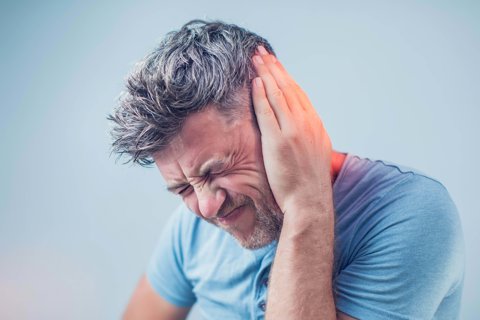
Can I Claim for Work Related Asthma?
You can claim compensation if you’ve developed asthma-type symptoms and it can be proven they’re linked to your job or working conditions.


Partner, Head of Employer's Liability - Serious Injury
Static white noise. While some like to fall asleep to it, others find it incredibly grating - it’s this persistent, high-pitched sound that you want to stop, immediately.
Those that suffer from tinnitus often hear a similar type of noise, except they can’t turn it off or stop it.



Tinnitus comes from the Latin word for “ringing.” This perfectly describes tinnitus, because sufferers tend to experience this persistent ringing, buzzing, whistling, hissing, or swooshing sound in their head or ears, even when they’re surrounded by silence.
This noise can be heard in one ear, both ears, or in the middle of the head and it can be low, medium, or high pitched.
For some, tinnitus can come and go sporadically. For others, it can be there constantly. If it’s there constantly, it can disrupt day-to-day living and cause insomnia, depression and anxiety.
Anyone can get tinnitus, including children, although it’s more common in people over aged 65.
Currently, around 15% of adults in the UK have tinnitus which is the equivalent of around 7.1 million people. This figure is expected to rise to 7.7 million by 2028.
Tinnitus can be brought on by several different things, from dental and jaw problems to ear infections and wax build-ups. And in some cases, there is no known cause.
But, the two most common causes of tinnitus, especially in work environments, are:
While an ageing population and the increased use of earphones and earbuds are likely to contribute to the rise of tinnitus sufferers, studies have also shown that the prevalence of tinnitus in those that have been exposed to excessive noise at work can be, in some cases, as much as 87.5%.
Have you ever come away from a music concert and found that you have a slight ringing in your ears? It’s because you’ve exposed your ears to noise that’s so loud, it’s damaged the fine hair cells in the innermost part of your ear, causing temporary hearing loss and perceived tinnitus.
As you’ve only exposed yourself to this level of noise for a short amount of time, the symptoms of tinnitus should usually subside after a few hours or days.
But imagine being exposed to that level of noise on a daily basis?
For example, if you work in a noisy factory, you might be surrounded by noisy machinery every day. If your employer doesn’t provide you with adequate ear protection, they’re leaving you vulnerable to developing hearing loss conditions, such as tinnitus.
Tinnitus can also develop after a head or neck injury. We’ve had clients who’ve developed tinnitus after:
For example, say you were a delivery driver that was involved in a minor road traffic accident. During the accident, if your neck got rapidly jerked as you were being thrown backwards, forwards, or sideways, the nerves, cartilage, and ligaments in your neck are likely to have been damaged.
This damage to your neck can affect the brainstem structures and nerves that are involved in hearing. If these structures and nerves are compressed or damaged, then tinnitus can develop.
If you’ve developed tinnitus because you’ve been exposed to loud noise or suffered a head or neck injury at work and weren’t given adequate protection by your employer, you could be entitled to make a claim.
Contact our specialist team of solicitors to see how we can help.
If you suspect you might have tinnitus, or you think your existing condition is getting worse, talk to your GP.
They’ll establish if your tinnitus is caused by an underlying problem that can be treated.
If your tinnitus isn’t down to an underlying problem and can’t be treated, then unfortunately there is no cure. But there are a few things you can do to help you manage your day-to-day symptoms, including:
CBT for tinnitus teaches you how to accept your condition. You’ll learn a set of skills that give you different ways to think, act, and pay attention to the symptoms which will help you gradually learn to accept and live with tinnitus.
Regardless of how you deal with your tinnitus, it’s still a difficult condition to have and affects your life in so many ways.
If you think your condition is connected to something that happened at work such as exposure to excessive noise or a head or neck injury, then do get in touch as we may be able to make a claim.
Whilst no amount of compensation can stop the symptoms of tinnitus, it might get you the therapy you need to help you live a happier life.

You can claim compensation if you’ve developed asthma-type symptoms and it can be proven they’re linked to your job or working conditions.

If you work in an environment where you are exposed to dust or fumes, then you may be at risk of developing an occupational lung or respiratory disease, particularly if your employer isn’t adequately protecting you against that risk.

If you suffer from work-related asthma, linking your asthma symptoms to your job can be difficult, so it’s important to look for clues that suggest it may be work-related. For instance, are your symptoms worse on working days and then improve over the weekend or when you’re on annual leave?
Fill in the form below to get in touch with one of our dedicated team members, or call our team today on: 0808 239 0144